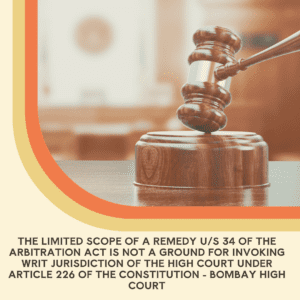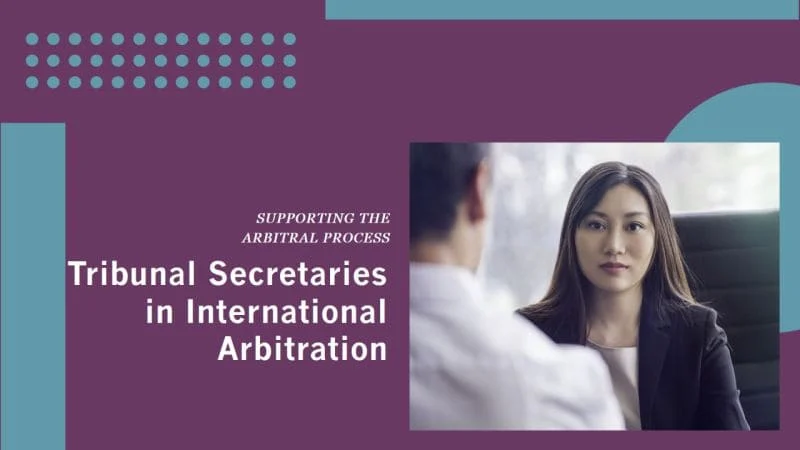
Case Title: M/s Omanand Industries & Anr. vs The Secretary to the Government of India, Ministry of Road Transport and Highways Dated: 31.03.2023
 The Bombay High Court has ruled that though the scope for challenging the compensation awarded by the Arbitrator to the landowners under Section 3-G (5) of the National Highways Act, 1956 (NHA) is limited to the parameters provided under Section 34 of the Arbitration and Conciliation Act, 1996 (A & C Act), the same cannot be a ground to invoke the High Court’s writ jurisdiction under Article 226 of the Constitution of India.
The Bombay High Court has ruled that though the scope for challenging the compensation awarded by the Arbitrator to the landowners under Section 3-G (5) of the National Highways Act, 1956 (NHA) is limited to the parameters provided under Section 34 of the Arbitration and Conciliation Act, 1996 (A & C Act), the same cannot be a ground to invoke the High Court’s writ jurisdiction under Article 226 of the Constitution of India.
 The Court held that absence of a remedy and the limited scope of a remedy are two different things, and it is permissible for the Legislature to narrow down the scope of any challenge which a Statute may provide to a litigant.
The Court held that absence of a remedy and the limited scope of a remedy are two different things, and it is permissible for the Legislature to narrow down the scope of any challenge which a Statute may provide to a litigant.
 The same cannot be a ground to create an additional remedy of invoking the writ jurisdiction of the High Court under Article 226 of the Constitution, the Court remarked.
The same cannot be a ground to create an additional remedy of invoking the writ jurisdiction of the High Court under Article 226 of the Constitution, the Court remarked.
 Referring to the provisions of the NHA, the Court took note that in case the compensation determined by the Competent Authority under Section 3-G (1) of the NHA is not acceptable, the same can be challenged before the Arbitrator. The Arbitrator is then empowered to determine the compensation under Section 3-G (5) of the NHA.
Referring to the provisions of the NHA, the Court took note that in case the compensation determined by the Competent Authority under Section 3-G (1) of the NHA is not acceptable, the same can be challenged before the Arbitrator. The Arbitrator is then empowered to determine the compensation under Section 3-G (5) of the NHA.
 The Court further observed, “The determination of the compensation by the Arbitrator under Section 3-G (5) of the N.H. Act is then open to further scrutiny, by the Court under Section 34 of the A & C Act which, in turn, is susceptible to a further challenge under Section 37 of the A & C Act, which, in turn, can be carried to the Hon’ble Apex Court in a petition for special leave to appeal under Article 136 of the Constitution of India.”
The Court further observed, “The determination of the compensation by the Arbitrator under Section 3-G (5) of the N.H. Act is then open to further scrutiny, by the Court under Section 34 of the A & C Act which, in turn, is susceptible to a further challenge under Section 37 of the A & C Act, which, in turn, can be carried to the Hon’ble Apex Court in a petition for special leave to appeal under Article 136 of the Constitution of India.”
 “It is, thus, apparent that there are as many as five opportunities provided to the landowner whose land is acquired under the N.H. Act, to question the grant of compensation awarded to him,” the Court concluded.
“It is, thus, apparent that there are as many as five opportunities provided to the landowner whose land is acquired under the N.H. Act, to question the grant of compensation awarded to him,” the Court concluded.
 The bench held that though the scope and the parameters for such challenge also go on reducing as a higher forum is to be approached, but that is the very basis of a hierarchical form of system without which the system may not work at all.
The bench held that though the scope and the parameters for such challenge also go on reducing as a higher forum is to be approached, but that is the very basis of a hierarchical form of system without which the system may not work at all.
 Further, the same cannot be a ground to create an additional remedy by invoking the writ jurisdiction of the High Court under Article 226 of the Constitution, the Court held.
Further, the same cannot be a ground to create an additional remedy by invoking the writ jurisdiction of the High Court under Article 226 of the Constitution, the Court held.


 The Bombay High Court has ruled that though the scope for challenging the compensation awarded by the Arbitrator to the landowners under Section 3-G (5) of the National Highways Act, 1956 (NHA) is limited to the parameters provided under Section 34 of the Arbitration and Conciliation Act, 1996 (A & C Act), the same cannot be a ground to invoke the High Court’s writ jurisdiction under Article 226 of the Constitution of India.
The Bombay High Court has ruled that though the scope for challenging the compensation awarded by the Arbitrator to the landowners under Section 3-G (5) of the National Highways Act, 1956 (NHA) is limited to the parameters provided under Section 34 of the Arbitration and Conciliation Act, 1996 (A & C Act), the same cannot be a ground to invoke the High Court’s writ jurisdiction under Article 226 of the Constitution of India.




